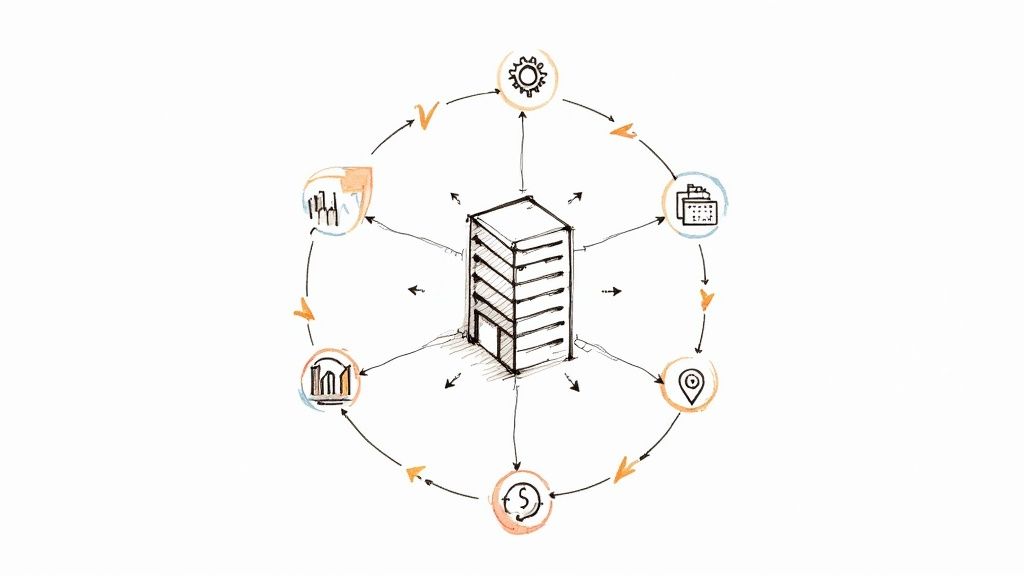
property management software features
Top Property Management Software Features to Boost Your Business
Posted on Sep 30, 2025

Choosing the right property management software isn't just about adding another tool to your belt. The features you select are the very engine of your operation, the difference between spinning your wheels on manual tasks and accelerating toward automated efficiency. These platforms are designed to handle everything from accounting and tenant communication to maintenance and marketing. Getting this choice right is absolutely fundamental to scaling your business and staying profitable.
Why Your Software Features Define Your Success
In today's cutthroat real estate market, trying to manage a portfolio with spreadsheets and scattered emails is like navigating a superhighway with a paper map. It's slow, painfully inefficient, and just one wrong turn away from a costly mistake. Modern property management is a whole different ballgame—tenants expect digital convenience, regulations are more complex than ever, and the pressure to tighten up operational margins never lets up. This is exactly where a solid software platform becomes your most valuable player.
The best systems don't just help you put out fires; they stop them from starting in the first place. They pull everything into one central hub where every task, message, and dollar is tracked and optimized. This foundation is what allows you to build a reliable business that can actually grow and adapt.
The Shift from Convenience to Necessity
What was once a helpful add-on for ambitious managers has quickly become a non-negotiable part of the business. You can see this shift just by looking at the money pouring into the industry. The global property management software market was valued at around USD 27.95 billion in 2025 and is on track to hit USD 54.16 billion by 2032. This explosive growth shows just how much managers are banking on technology to keep up.
Think of it this way: Your software isn't just a digital filing cabinet. It's the central nervous system of your portfolio, connecting tenants, owners, vendors, and your team in a seamless, intelligent network.
Building a Foundation for Growth
The features you choose have a direct line to your ability to scale. While every portfolio has its own quirks, some capabilities are universally crucial for setting your business up for long-term success. It's also vital to understand that not all software is created equal, especially when you're in a specific niche. For instance, our guide on property management software for vacation rentals dives into the unique tools needed for the fast-paced short-term rental market.
Ultimately, the goal is to stop being reactive and start being proactive. The right features empower you to do just that. They should help you:
- Automate repetitive tasks like chasing rent and sending renewal reminders.
- Enhance tenant satisfaction with slick online portals and lightning-fast communication.
- Give owners transparent insights through detailed, easy-to-read financial reports.
- Make data-driven decisions to nail your pricing and slash vacancies.
This guide will walk you through the essential features that make all this possible, helping you build a stronger, more profitable operation from the ground up.
The Foundational Features Your Business Needs to Survive
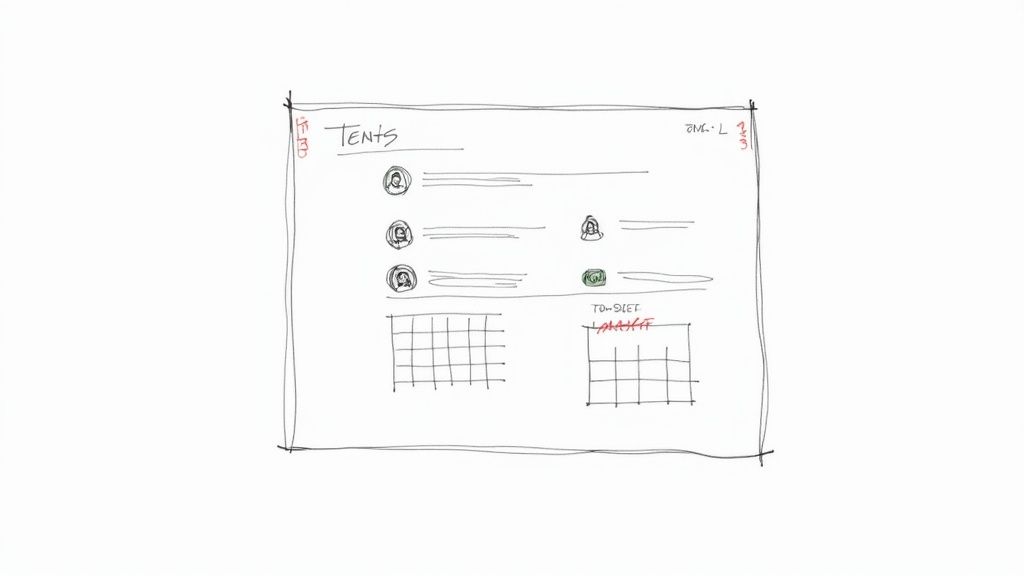
Think of your property management business like a high-performance car. The shiny paint and killer sound system are nice, but it's the engine, transmission, and chassis that actually get you down the road. Foundational software features are your operational engine—they aren’t optional extras. They are the core components that keep your business from breaking down.
Without these essentials, you're stuck trying to run things with spreadsheets, sticky notes, and your own memory. That system might work for one or two properties, but it falls apart fast as you grow.
Let's break down the non-negotiable features that form the central nervous system of a stable, scalable, and profitable operation.
Accounting and Financial Reporting
Before anything else, you have to be a master of the money—collecting it, tracking it, and reporting on it with absolute precision. Trying to do this manually is a recipe for disaster, riddled with human error, missed payments, and endless hours spent trying to make the numbers add up.
A solid accounting module automates this entire headache. Imagine rent payments logging themselves, late fees being applied without you lifting a finger, and vendor invoices getting paid and recorded in one clean workflow. That's what a good system delivers. It transforms a chaotic mess of transactions into a crystal-clear financial picture.
This feature absolutely must handle:
- Online Rent Collection: Securely process payments via ACH, credit card, or debit card.
- Automated Late Fee Calculation: Enforce your lease terms consistently, every single time.
- Vendor and Bill Management: Track invoices, schedule payments, and keep an eye on all your expenses.
- Owner Payouts: Generate professional owner statements and get distributions out accurately and on time.
Strong financial reporting isn't just about knowing where the money is. It's about building trust. When you can provide owners with transparent, easy-to-read statements, you're proving your value.
Tenant and Lease Management
At the very heart of your business are your tenants and the legally binding agreements you have with them. Juggling this relationship is the key to minimizing vacancies and staying compliant. A dedicated lease management module acts as both your digital vault and your automated personal assistant.
This system securely stores every single lease, addendum, and piece of communication, making critical documents available with a single click. No more frantic digging through filing cabinets or searching for lost emails. Of course, managing these interactions well requires understanding the customer relationship management (CRM) basics, which is a cornerstone for any thriving property management business.
Even better, it automates key dates. The software can send out automatic renewal reminders to tenants 60-90 days before a lease expires, giving you a huge head start on keeping your properties filled. It also tracks rent increases, move-in/move-out inspections, and other critical milestones you can't afford to miss.
Maintenance Coordination and Work Orders
Nothing tanks a tenant relationship faster than a poorly handled maintenance request. A leaky faucet might seem like a small thing, but a slow, disorganized response is a fast track to negative reviews and tenants who don't renew. A maintenance coordination feature turns this potential chaos into a streamlined, trackable workflow.
Here’s how it works:
- A tenant submits a request—complete with photos—through their online portal.
- The system instantly creates a digital work order. No more lost texts or voicemails.
- You assign that work order to your preferred vendor, right from the platform.
- Everyone involved—the vendor, the tenant, and your team—can communicate and see the job's status until it's marked complete.
This centralized process gets rid of the frantic phone calls and the dreaded "he said, she said" confusion. Every step is documented, creating a clear record for owners and ensuring everyone is held accountable. It turns maintenance from a reactive headache into a proactive, efficient part of your service.
To wrap up, these foundational tools aren't just about convenience; they're about survival. They solve the most pressing, time-consuming problems that every property manager faces.
Here's a quick look at how these core features directly tackle those daily challenges.
Core Property Management Software Features Breakdown
| Core Feature | Primary Function | Key Problem Solved |
|---|---|---|
| Accounting & Financials | Automates income/expense tracking, payments, and reporting. | Eliminates manual bookkeeping errors and saves hours on financial tasks. |
| Lease Management | Centralizes lease documents, tracks key dates, and manages renewals. | Reduces vacancy rates by automating renewals and prevents compliance issues. |
| Maintenance Coordination | Creates and tracks work orders from tenant request to completion. | Improves tenant satisfaction with faster response times and provides a clear audit trail. |
Ultimately, investing in a system with these core functionalities is the first and most important step toward building a business that can grow without imploding. They provide the stability you need to stop firefighting and start focusing on scaling.
Features That Create an Unforgettable Tenant Experience
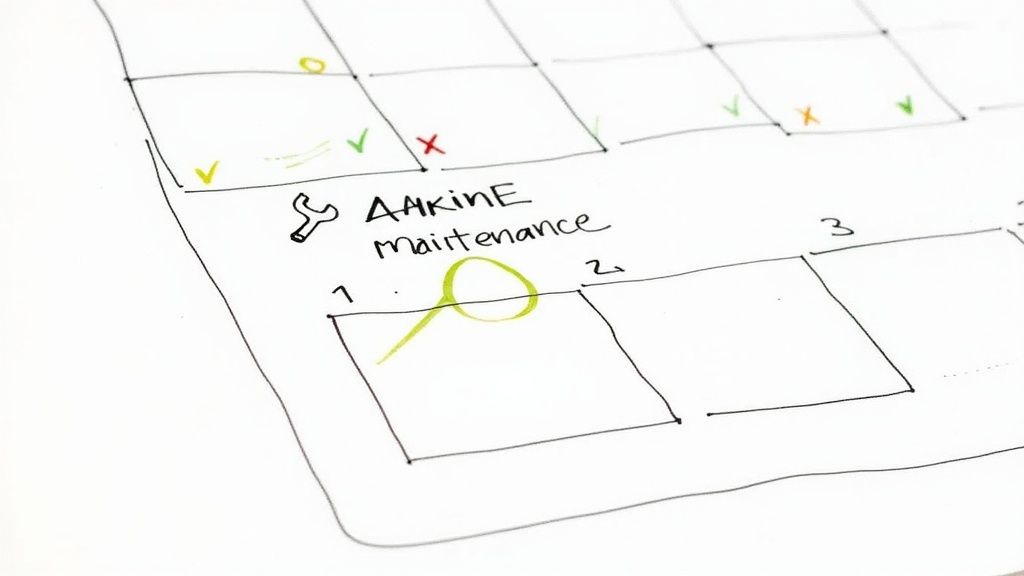
While the back-office tools keep your business humming, it’s the tenant-facing property management software features that truly make it sing. Happy tenants are the lifeblood of a healthy rental business. They renew their leases, care for your property like it's their own, and become your best marketers through glowing reviews. Ignoring their experience is a surefire way to drive up turnover and watch your costs balloon.
Think about it. We can order dinner, book a flight, and stream a movie in just a few taps. Renters now expect that same digital ease from their housing. The days of dropping off paper checks or playing phone tag over a leaky faucet are over. They want self-service options, clear communication, and immediate access to information.
Delivering a top-notch tenant experience isn't about splashy, expensive gestures. It's about smoothing out the friction in their everyday lives. The right software gives residents the tools they need, reduces their stress, and, in turn, makes your job a whole lot easier.
Empowering Residents with a Tenant Portal
The tenant portal is your digital front door. Think of it as a personal command center where residents can handle everything related to their rental, 24/7, without having to call you for every little thing. This one feature is arguably the most powerful tool you have for boosting tenant satisfaction.
A well-designed portal pulls all the essential tasks and info into one place, giving tenants a real sense of control. This self-service approach cuts way down on the administrative chatter—the endless phone calls and emails—that can eat up a property manager's entire day.
A great tenant portal should let residents:
- Pay Rent Online: They can easily set up one-time or recurring payments through ACH or credit card, check their payment history, and get automatic receipts. This feature alone ends the monthly headache of chasing down rent checks.
- Submit Maintenance Requests: Residents can log a work order with detailed notes and even photos right from their phone. This creates an instant, trackable record of the problem from the moment it’s reported.
- Access Documents: Leases, policy documents, and community rules are all available on demand, letting tenants find answers to their own questions anytime they want.
- Use a Communication Hub: Every message between you and your tenants is stored in one spot, creating a clean and organized conversation history you can both refer back to.
A tenant portal shifts the landlord-tenant dynamic from a series of manual chores into a smooth, digital partnership. It meets the modern demand for convenience and is an absolute game-changer for retention.
Keeping Everyone in the Loop with Automated Communications
Clear, consistent communication is everything. But who has the time to manually send every rent reminder, maintenance update, and building announcement? This is where automated communication becomes a manager’s secret weapon. These tools let you "set it and forget it" for all those routine messages.
For instance, you can schedule automated emails or texts to go out a few days before rent is due, the moment a maintenance ticket is updated, or 90 days before a lease is up for renewal. This proactive approach keeps tenants in the loop, cuts down on late payments, and makes sure no one is caught by surprise.
Streamlining the First Impression with Digital Applications
The tenant experience starts long before they ever move in. A clunky, paper-based application process can be a huge red flag for quality renters. Digital application and screening features create a polished, professional first impression right from the get-go.
With a digital process, applicants can:
- Apply online from any device, anywhere.
- Pay application fees securely.
- Electronically sign off on background and credit checks.
The software then does the heavy lifting, running the necessary checks and dropping a comprehensive report right in your lap. This dramatically speeds up the entire leasing cycle, helping you fill vacancies faster with the best possible tenants. By starting the relationship off on a positive, tech-forward note, you're setting the stage for a great long-term experience.
Advanced Features That Unlock Portfolio Growth
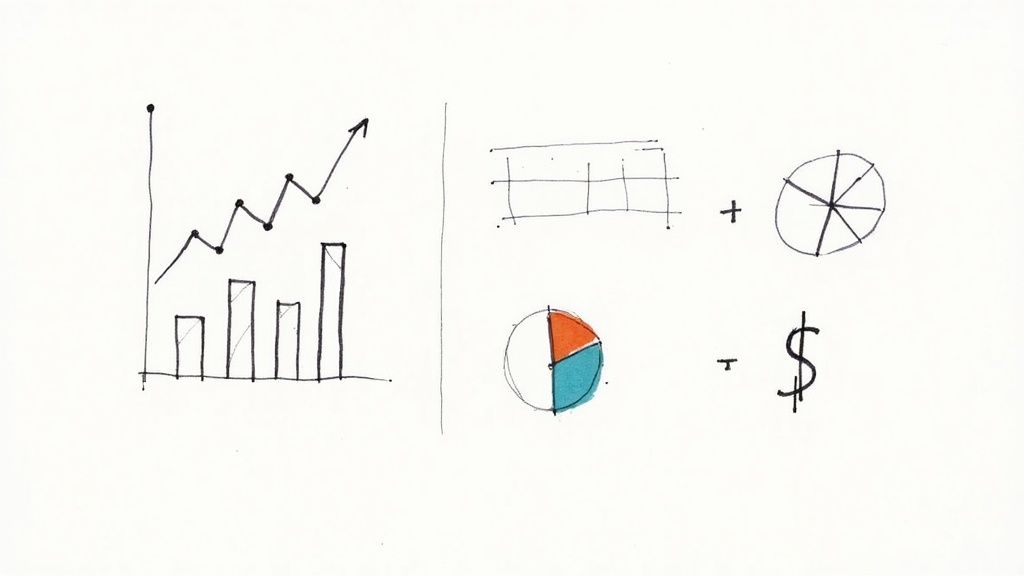
Once you've got your day-to-day operations humming along with solid foundational tools, it's time to shift gears. You can stop just managing your properties and start actively growing your portfolio. This is where advanced property management software features come into play, moving you from defense to offense. They're the tools that turn a reactive manager into a proactive business strategist.
Think of it like this: your foundational features are the engine that keeps the car running smoothly. Advanced features are the GPS, the turbocharger, and the performance analytics that actually help you win the race. They have one main job—to help you scale your business intelligently and squeeze every drop of profit out of your portfolio.
Let's dive into the high-impact tools that turn your operational data into a strategic weapon, fueling the smart, data-backed decisions that clear the path for serious growth.
Marketing and Listing Syndication
Let's be honest: a vacant property is a money pit. Every single day it sits empty, potential income is just leaking away. Manually posting your listings to Zillow, Apartments.com, and every other rental site out there is a soul-crushing, error-prone task. This is where marketing and listing syndication becomes an absolute game-changer.
This feature is basically a master key for your marketing. With just a couple of clicks, it automatically blasts your vacancy details—photos, descriptions, pricing, you name it—to dozens of high-traffic listing sites all at once.
The second you update a listing in your software, that change pops up everywhere online. This automation doesn't just save you a ton of hours; it massively expands your reach, putting your properties in front of a much bigger pool of potential renters. It’s the difference between fishing with a single line and casting a giant net.
Secure Owner Portals
Building trust with property owners is the bedrock of a successful management business. They've handed you a massive financial asset, and what they really crave is transparency and clear communication. An owner portal is the perfect tool for the job—a dedicated, secure website that delivers exactly that.
Instead of fielding a constant stream of calls and emails asking for financial updates, you can give owners 24/7 access to everything they need to know about their investment. This self-service model builds incredible confidence and reinforces your value as a professional, organized partner.
A good owner portal will typically provide:
- Real-time Financial Statements: Owners can check in on income, expenses, and net profit whenever they want.
- Document Access: Key documents like lease agreements, management contracts, and vendor invoices are all stored in one secure spot.
- Contribution and Draw Management: Owners can easily chip in for repairs or pull out their monthly profits.
- Performance Dashboards: Simple, visual reports show occupancy rates, maintenance costs, and other key metrics at a glance.
By offering this level of transparency, you’re not just providing a service; you’re building a relationship. Owners who feel informed and in control are far more likely to stick with you for the long haul and recommend you to others.
Business Intelligence and Analytics
If data is the new oil, then a business intelligence (BI) and analytics dashboard is your refinery. This is easily one of the most powerful advanced features you can get, turning the raw data from your daily grind into actionable insights that can steer your entire business strategy.
Without analytics, you're flying blind. You’re making critical decisions based on gut feelings instead of hard evidence. A BI dashboard sucks in information from every corner of your software—accounting, leasing, maintenance—and spits it out into clear, visual charts and graphs.
This lets you spot trends, identify opportunities, and sniff out problems before they blow up. For instance, you could analyze:
- Vacancy Trends: Which units are turning over the fastest? Is there a seasonal pattern to your vacancies?
- Marketing Effectiveness: Which listing site is actually sending you the most qualified leads?
- Maintenance Costs: Are repair costs for a specific property slowly creeping up, signaling it's time for a major upgrade?
- Pricing Optimization: How do your rental rates stack up against the market average in your neighborhood?
These insights give you the power to make smarter, more profitable decisions. For managers in the fast-paced world of short-term rentals, knowing how to apply these analytics is crucial. Digging into a guide on how to use AI to automate your short-term rental business can unlock even deeper strategies for using technology to grow. When you use these advanced tools, you stop being just a property manager and become the optimizer of a high-performance investment portfolio.
Specialized Features for Your Unique Niche
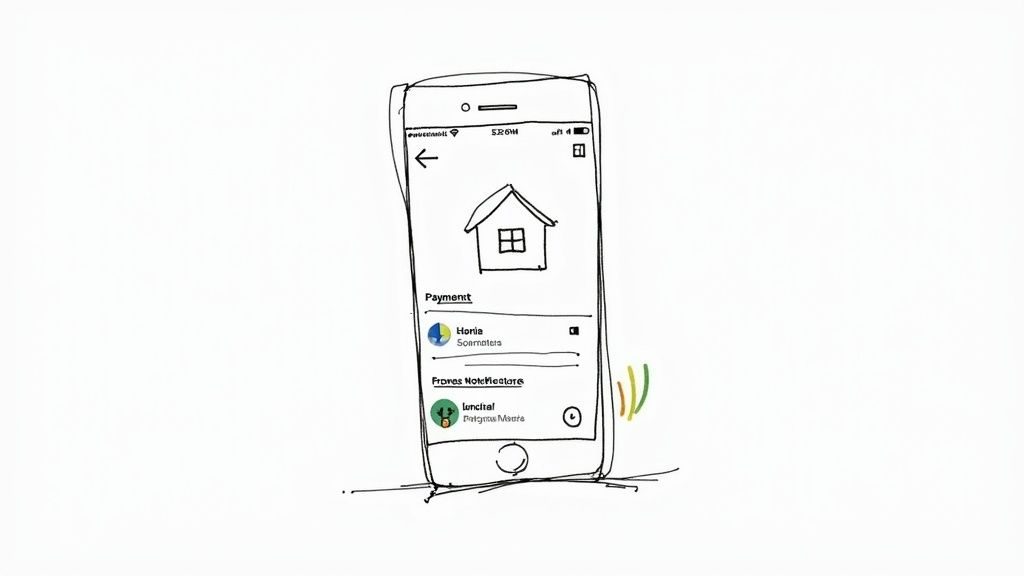
Standard residential software gives you a great foundation, but when you're deep in the property management trenches, one size rarely fits all. Trying to run a commercial building or a portfolio of vacation rentals with generic tools is like using a family sedan to haul construction materials. Sure, you might get the job done, but it's going to be inefficient, frustrating, and ultimately, a drain on your bottom line.
Every market niche has its own rhythm, its own language, and its own set of headaches. Picking a platform with the right specialized property management software features is what separates the pros from the amateurs. It saves you from relying on clunky spreadsheets and manual workarounds, ensuring your tech is a perfect partner for your business.
Features for Commercial Property Management
Managing commercial real estate is a completely different ballgame than residential rentals. You're dealing with longer leases, far more complex financial calculations, and tenants who are businesses with their own unique demands. A standard platform just can’t hang.
Commercial property software needs specialized tools built for this exact environment:
- Common Area Maintenance (CAM) Reconciliation: This is the big one. The software has to automatically calculate and bill tenants for their slice of common area costs like landscaping, security, and utilities. Doing this by hand is a complete nightmare.
- Complex Lease Abstraction: Commercial leases are dense, multi-year contracts filled with unique clauses, rent escalations, and renewal options. The right software digitizes and tracks these critical details, flagging important dates so you never miss a deadline or a rent increase.
- Advanced Financial Reporting: Commercial property owners need sophisticated reports. Think detailed rent roll analysis and automatic calculations for CPI-based rent increases—things your average residential software wouldn’t even touch.
Tools for Homeowner Association Management
Running a Homeowner Association (HOA) or condo association is less about being a landlord and more about community governance. The whole game is about enforcing bylaws, managing shared pools and clubhouses, and keeping communication flowing between residents and the board.
HOA management software is basically the digital town square for a community. It’s where rules get clarified, dues get paid, and residents stay in the loop, making sure the entire association runs smoothly and transparently.
Key features you absolutely need for this niche include:
- Violation Tracking: This lets managers document bylaw violations with photos, shoot out automated notices to homeowners, and track an issue all the way to resolution.
- Board Communication Portals: A secure, private space for board members to discuss issues, vote on motions, and access important community documents is non-negotiable for effective governance.
- Dues and Assessment Collection: The system needs to seamlessly handle regular dues as well as those one-off special assessments for big projects, providing crystal-clear statements to every homeowner.
The demand for more transparency and stricter rules around reserve funds is fueling huge growth here. The market for these specialized platforms is set to expand at an 11.5% CAGR as more HOAs wise up and move their operations online. You can get a closer look at these trends and learn more about the evolving property management software market.
Essentials for Short-Term Rental Management
The short-term rental (STR) market moves at lightning speed. Your success hinges on maximizing occupancy, nailing your nightly rates, and delivering a flawless guest experience—often across a half-dozen booking platforms at once. Standard long-term rental software is completely out of its depth here.
STR managers need a toolkit built for this fast-paced world. We actually put together a detailed guide on short-term rental booking software if you want to go deeper.
Here are the absolute must-haves:
- Channel Management: This is non-negotiable. The software has to sync your calendar and pricing in real-time across Airbnb, Vrbo, Booking.com, and your own direct booking site. Without it, double bookings are inevitable.
- Dynamic Pricing Integrations: The best platforms plug into pricing tools that analyze market demand, local events, and what your competitors are doing. They then automatically adjust your nightly prices to maximize every dollar.
- Automated Guest Messaging: From booking confirmations and check-in instructions to those all-important post-stay review requests, automated messaging saves countless hours and makes sure every guest gets professional, timely communication.
So, How Do You Pick the Right Features for Your Business?
Walking through the world of property management software can feel like staring at a wall of TVs, each one screaming about its endless features. It’s easy to get overwhelmed. But here’s the secret: the goal isn’t to find software with the most features. It’s about finding the one with the right features for your specific business.
Think of it like building out a workshop. A guy who builds custom furniture doesn't need the same heavy-duty metalworking tools as someone who fabricates industrial parts. Your job is to pick the exact instruments that will help you build and grow your business, leaving all the expensive, unnecessary gadgets on the shelf.
Must-Haves vs. Nice-to-Haves: Draw Your Line in the Sand
First things first, you need to map out your day-to-day grind and pinpoint what’s causing you the most headaches. Are you wasting hours manually chasing down rent payments? Are maintenance tickets getting lost in your inbox? This simple exercise is the key to separating your absolute needs from the shiny bells and whistles that look cool but don't solve a real problem.
Grab a notepad and create a quick checklist to keep you honest during your search:
- Portfolio Size: Let's be real, someone with five units has a completely different reality than a manager with fifty. If you're small, you want to nail the fundamentals like accounting and tenant communication. As you grow, that's when robust automation and deep analytics become non-negotiable.
- Property Type: Are we talking residential, commercial, or a bunch of short-term rentals? Each one is its own beast and needs specialized tools. Commercial managers live and die by CAM reconciliations, while vacation rental pros can't function without a solid channel manager.
- Growth Goals: Are you planning to scale up, and fast? If that’s the plan, features like marketing syndication to get your listings out there and business intelligence dashboards aren't just "nice-to-haves"—they're your must-haves for growth.
How to Ask the Right Questions on a Demo
Software demos are your chance to cut through the slick sales pitch and see what the platform is really made of. When you come prepared with your checklist, you can ask laser-focused questions that tell you if the system is actually a good fit.
Don't just ask what a feature does. Ask how it solves one of your specific problems. For instance, instead of asking, "Do you guys have an owner portal?" try this: "How can your owner portal give my clients a totally transparent, real-time look at their property's financial performance?"
Another huge area to dig into is compliance. Risk management features have become absolutely essential, helping managers navigate the tangled web of regulations like fair housing laws and data privacy rules. Tools that automate compliance checks save you a ton of manual effort and, more importantly, can help you avoid costly legal trouble.
And when you're ready to see what's out there, checking out curated lists of the 12 best property management apps can give you a great lay of the land. By zeroing in on what you actually need and asking sharp questions, you’ll be in a much better position to pick software that becomes the reliable backbone of your business for years to come.
Got Questions? We've Got Answers
Stepping into the world of property management software can feel a bit overwhelming. There are a lot of options out there, and it’s not always easy to figure out which features line up with what you actually need. Here are some of the most common questions we hear from managers trying to make the right call.
What Features Should I Focus On For a Small Portfolio?
When you’re just starting out or only have a handful of properties, your game is all about efficiency and nailing the basics. It’s easy to get distracted by fancy analytics or complex marketing tools, but you need to prioritize the core property management software features that save you the most time and prevent rookie mistakes.
Think of it like building a house—you pour the concrete foundation before you start picking out curtains. For a smaller portfolio, these are your non-negotiables:
- Online Rent Collection: This is a huge one. It gets rid of the headache of chasing down checks and manually tracking payments, which directly boosts your cash flow.
- Maintenance Coordination: You need a simple, easy-to-track system for handling work orders. It’s key to keeping your tenants happy and protecting the properties themselves.
- Basic Accounting and Reporting: Without a solid way to track income and expenses, you’re flying blind. This is crucial for knowing if you're actually profitable and for making tax season less of a nightmare.
Can This Software Play Nice with Other Tools, like QuickBooks?
Yes, and honestly, this is a question you should be asking on every software demo. The real magic happens when your different tools can talk to each other, creating an efficient tech setup that just works. This connection is usually made possible by something called an API (Application Programming Interface), which is basically a bridge that lets different software programs share data automatically.
A perfect example is integrating your property management software with QuickBooks. When they’re connected, you don't have to waste time manually entering financial data in two different places. Rent payments you collect in your PMS can flow right into your accounting software, saving you hours of work and cutting down the risk of human error.
What's the Real Difference Between Cloud-Based and On-Premise Software?
The choice between these two really boils down to three things: accessibility, cost, and control. Think of on-premise software like buying a physical server and keeping it in your office. You own it, you control it, but you're also on the hook for all the maintenance, security, and updates. It’s your baby, for better or worse.
Cloud-based software, often called SaaS (Software as a Service), is more like streaming a movie instead of buying the DVD. You just access it online through a subscription, and the provider takes care of all the behind-the-scenes stuff like security patches and software updates.
For most property managers today, cloud-based is the clear winner. It gives you the freedom to run your business from anywhere, usually has a much lower upfront cost, and you're always on the latest version of the software without having to lift a finger.
Ready to grow your short-term rental business with features designed for direct bookings? hostAI provides an advanced suite of AI-powered tools to enhance your online presence and increase revenue. Explore how our intelligent websites and automated marketing can transform your brand at https://gethostai.com.